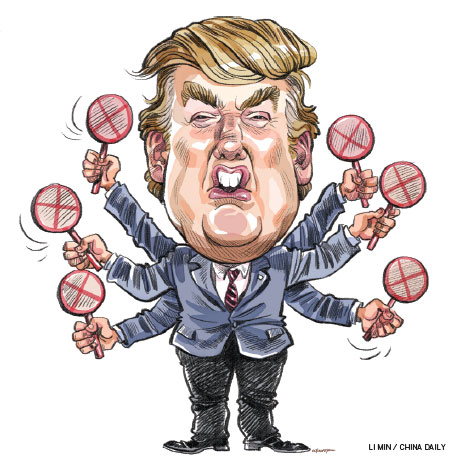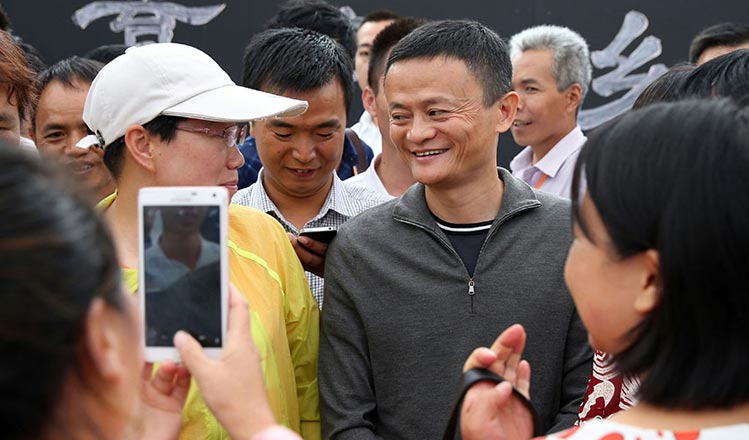What is the cause of Trump's popularity?
Updated: 2016-08-08 08:47
By Aamir Khan(China Daily USA)
|
||||||||
Ever since Donald Trump declared himself as a Republican presidential candidate, he has been subjected to fierce, even vitriolic critique. He has been seen as a misogynist, isolationist, xenophobic, anti-Muslim and a neophyte in understanding the complexities of economics. And yet he has beaten the odds to become the Republican presidential nominee. We may not like him, but we cannot escape asking ourselves: How did he do it?
To find the answer, we should examine the roots of his popularity without evaluating which part of his still-evolving farrago is fact or myth. I will specifically examine his views on foreign policy, international trade and internal security and argue Trump has ingeniously targeted two major American segments that will matter in the elections.
In his seminal foreign policy speech of April 27, Trump claimed the United States no longer had a clear understanding of its policy goals. The US has gone from committing mistakes in Iraq to Egypt to Libya, to President Barack Obama's line in the sand in Syria. Israel has been snubbed. Iran was allowed to cut a favorable deal. And the Democratic People's Republic of Korea has become more aggressive. All this has allowed the US' allies to perceive its weakness and thus not pay their dues.
In international trade, Trump has threatened a 35 percent tariff on goods imported from Mexico and a 45 percent tariff on imports from China. Whether or not these threats will (or can) be actualized, given the extraordinary cost of these measures that will be borne by the US economy, is irrelevant for now. We need to understand why the above pronouncements appeal to the American electorate.

To begin with, his strong defense of Israel is in line with past pre-election statements of major candidates and is a hygiene factor. His references to mistakes in Iraq, Egypt, Libya and Syria bring under one umbrella the Republican George W. Bush and Democrat Obama eras, even though he only names the latter. These references are also in sync with recent polls that suggest growing voter apathy toward the US' global wars.
Further, the American voter has been buffeted by the double whammy of the global financial crisis that refuses to go away and automation-driven technology that now threatens to take away even more jobs. The essential part of Trump's speeches is, the US is being taken advantage of by both its security and economic partners. This is music to voters' ears. So are his denunciations of North American Free Trade Agreement ("complete disaster") and Trans-Pacific Partnership ("rape of our country").
Which segment does Trump's focus on Islamic radicalism and Mexican "criminals" appeal to? This is more complex. As one writer put it colorfully, US society can be visualized as divided into erstwhile feudal landowners, white slave-drivers and slaves. It is the figurative d��class�� white slave-drivers who are rebelling against the Democrats and who find the anti-Muslim and anti-Mexican focus gratifying. That this segment has been shaken by a black president adds piquancy to their protest.
Will Trump's popularity extend to the wider electorate? This will of course depend on many factors. It is possible that Trump may finally trip on some egregiously inadvisable remark such his recent rhetorical attack on Khizr and Ghazala Khan, parents of an Army captain who was killed by a suicide bomber in Baghdad in 2004. There are some 3.3 million Muslims in the US, many of whom have been offended by him.
Trump needs to extend his vote-bank to Mexicans and women as well. The US establishment's isolationist perception of Trump's views on foreign policy could eventually cause serious problems for him.
What is clear, though, is that Democrat Hillary Clinton will need all her strengths and his foibles to beat the feisty Trump in the forthcoming presidential elections.
The author is a former Lecturer in Marketing at Cranfield University.
(China Daily USA 08/08/2016 page12)
- Nepal's newly elected PM takes oath
- Texas gun law worries incoming students
- China vows to deepen economic, trade cooperation with ASEAN
- Fire guts Emirates jet after hard landing; 1 firefighter dies
- Egypt's Nobel-laureate scientist dies of illness in US
- THAAD muscle flexing unmasks anxiety over declining hegemony

 Big names train for Rio 2016
Big names train for Rio 2016
 Photo exhibition narrates charm of old Beijing
Photo exhibition narrates charm of old Beijing
 Traditional Tibetan handicrafts kept alive in SW China
Traditional Tibetan handicrafts kept alive in SW China
 Chinese Vice Premier visits Olympic delegation
Chinese Vice Premier visits Olympic delegation
 World's fastest bullet train to start operating next month
World's fastest bullet train to start operating next month
 Jack Ma visits rural school, meets teachers
Jack Ma visits rural school, meets teachers
 Top 8 global market leaders from China
Top 8 global market leaders from China
 After Typhoon Nida, torrential rain hits S. China
After Typhoon Nida, torrential rain hits S. China
Most Viewed
Editor's Picks

|

|

|

|

|

|
Today's Top News
US launches airstrikes against IS targets in Libya's Sirte
Ministry slams US-Korean THAAD deployment
Two police officers shot at protest in Dallas
Abe's blame game reveals his policies failing to get results
Ending wildlife trafficking must be policy priority in Asia
Effects of supply-side reform take time to be seen
Chinese State Councilor Yang Jiechi to meet Kerry
Chinese stocks surge on back of MSCI rumors
US Weekly

|

|